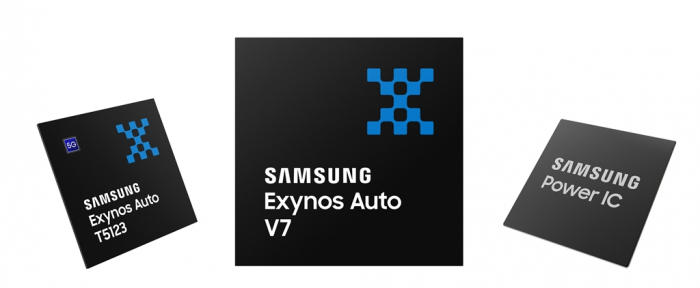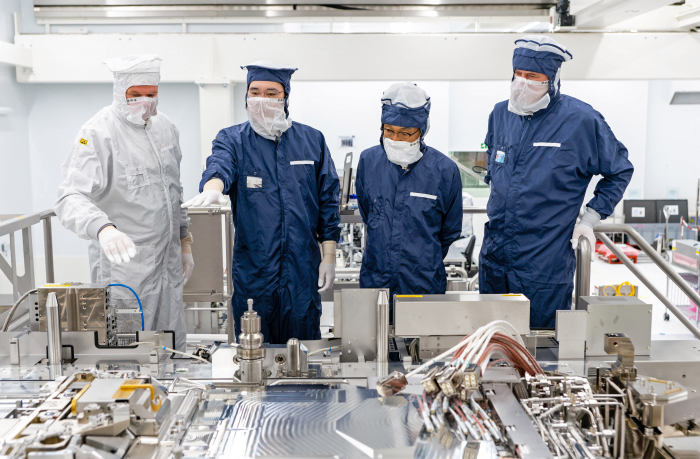Korean chipmakers
Samsung Elec. executes surprise chip executive reshuffle
The unexpected reshuffle comes just before Samsung's de facto leader Jay. Y Lee is visiting ASML in the Netherlands
By Jun 03, 2022 (Gmt+09:00)
3
Min read
Most Read
LG Chem to sell water filter business to Glenwood PE for $692 million


Kyobo Life poised to buy Japan’s SBI Group-owned savings bank


KT&G eyes overseas M&A after rejecting activist fund's offer


StockX in merger talks with Naver’s online reseller Kream


Mirae Asset to be named Korea Post’s core real estate fund operator



Samsung Electronics Co. undertook an unexpected personnel reshuffle on Thursday, involving 20 employees, to hold them accountable for a lower-than-expected yield of its new mobile application processor, the so-called brain of a smartphone, according to sources familiar with the matter.
Notably, the world’s top memory chipmaker replaced 10 higher-ranking executives in the semiconductor division, including the flash chip development chief and the foundry business head.
The reshuffle is related to the world’s largest smartphone brand’s mobile application processor chip under development. The chip, dubbed Exynos, was supposed to be used for its latest handset model, Galaxy S22, early this year.
But its low yield forced Samsung to turn to Qualcomm’s Snapdragon processors for the Galaxy S22 model, except for the handsets shipped to Europe.
The mishap was a hard lesson for Samsung that even superior design doesn't work without an advanced process system and pushed the company to focus on upgrading its chip design and process systems in the second half of this year, according to industry watchers.
The dismissal of the executives came just a few days before Samsung Electronics' de facto leader Jay Y. Lee is heading to the Netherlands to visit ASML Holding NV, the world's only producer of extreme ultraviolet light (EUV) scanners, key in producing advanced chips.
SECURING LITHOGRAPHY MACHINES
The Netherlands is the first destination for Lee's business trip, about two weeks after the parent Samsung Group unveiled its largest-ever, five-year investment plan of 450 trillion won ($355 billion).
On June 2, Lee’s legal representative notified the Seoul Central District Court of his business trip scheduled for June 7 to 18 to postpone a hearing over his alleged involvement in a controversial merger between Samsung C&T Corp., the group's de facto holding company and Cheil Industries Inc. back in 2015.
Responding to a judge asking “if the trip to the Netherlands is to discuss the supply of EUV scanners,” Lee’s attorney answered in the affirmative.
The court approved postponing his hearing.
It will be Lee’s second official visit to ASML headquarters in less than two years. Back in 2020, he toured the Dutch company's plant to discuss the supply of the lithography machine.

PREREQUISITE FOR BOOSTING CHIP PRODUCTION
EUV scanners can draw more elaborate and detailed patterns on semiconductor wafers, with short wavelengths equivalent to one-14th of conventional argon fluoride (ArF) technology.
The lithography machine also simplifies the chip manufacturing process by cutting the number of photolithography processes required to create fine circuits.
But its supply is limited to about 40 units per year since it takes two years to produce one scanner, while costing 200 billion to 300 billion won ($160 million-$240 million) per unit.
Further, the halted production of optical lenses by Carl Zeiss due to supply chain disruptions further delayed the production of EUV scanners. ASML relies on the German supplier for the core component for EUV lithography machines.
Amid the prolonged chip shortage, chipmakers around the world are competing to secure EUV scanners to expand their production lines.
The world’s largest foundry maker Taiwan Semiconductor Manufacturing Co. (TSMC) has more than 100 EUV scanners. But Samsung has only 15 units of the lithography machine, although it plans to overtake TSMC by 2030.
“To draw up plans on production lines, securing the relative equipment should come first,” said an industry insider.
“In order to compete with TSMC, Samsung needs to win in the competition to procure EUV scanners.”
In particular, Samsung needs to sign a EUV scanner supply deal within the year for its second foundry plant to be built in Taylor, Texas. The plant is poised to be operational in the second half of 2024.
Also, Lee's meeting with visiting Intel Corp. Chief Executive Pat Gelsinger early this week is expected to present a new opportunity for Samsung, they said.
(Updated on June 7 to change the structure of this article)
Write to Shin-Young Park and Ji-Eun Jung at nyusos@hankyung.com
Yeonhee Kim edited this article.
More to Read
-
 Corporate investmentSamsung to invest $355 billion in chip, biotech, 6G over five years
Corporate investmentSamsung to invest $355 billion in chip, biotech, 6G over five yearsMay 24, 2022 (Gmt+09:00)
3 Min read -
 Korean chipmakersSamsung to ramp up EUV scanners to take on foundry leader TSMC
Korean chipmakersSamsung to ramp up EUV scanners to take on foundry leader TSMCMar 15, 2021 (Gmt+09:00)
3 Min read
Comment 0
LOG IN


